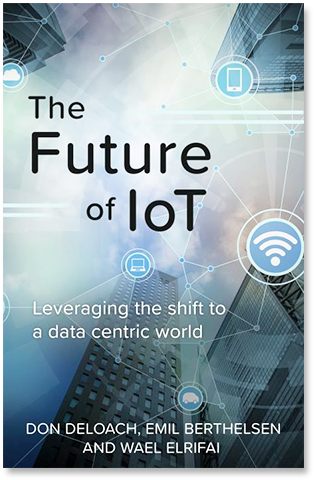The Future of IoT, book review: It's all about the data


The Future of IoT: Leveraging the Shift to a Data-Centric World • By Don Deloach, Emil Berthelsen, and Wael Elrifai • self-published • 257 pages • ISBN: 978-1-54390-352-2 • $16.95 (hardcover) / $9.99 (ebook)
Discussions of the Internet of Things (IoT) typically focus on one of a few topics. Chief among them is security: even at this early stage we are awash in stories about manufacturers moving into the field without updating their threat models and the consequences of this gap in their thinking. Researchers are hacking cars, finding security flaws in connected toys, and fretting about botnets composed of baby monitors and personal digital recorders. Along with security is privacy: do you really want your child's confidences to Hello Barbie stored in the cloud, or your car's knowledge of your driving habits sent to your insurer?
Both these topics get short shrift in The Future of IoT, which is intended to help businesses understand the difficulties of moving into this new technological world. The chief thing about all those stories is the central weight given to the 'things' in the IoT and the gadgets that consumers or the public sector decide to buy. In their book, Don DeLoach, Emil Berthelsen, and Wael Elrifai focus their discussion on the data these devices collect.
For businesses, data and its ramifications will be the key IoT issue. How is that data used? Who gets to claim ownership? All of these are problems that businesses will have to manage as their internal systems become increasingly complex, and there are few guides to help. This is the sort of book that you ideally want to read before you start installing things.
Mysterious omission
Their choice of focus makes sense when you discover the authors' backgrounds: DeLoach is a software entrepreneur focused on data; Elrifai is a technologist and management strategist who's been working in big data and AI; and Berthelsen is a research director at Gartner. However, collectively they leave an important gap -- mysteriously, given the book's publication date (2017) and country of origin (two of the authors appear to be based in or connected to the UK): data protection law and its upcoming replacement, the General Data Protection Regulation (GDPR). Their single chapter on security and privacy notes that these are important issues without mentioning legal requirements or compliance.
That said, there are plenty of other issues for businesses to consider as the IoT takes shape, few of which have received much coverage. Here, the authors begin by placing the IoT in its historical context, discuss building systems and different types of analytics, consider the future of IoT systems, and outline the operational challenges for businesses in terms of deploying, managing and investing in these systems. Security and privacy fall in the section on fundamental flaws in the present state of the art, with other entries in this section covering limitations, data ownership, and governance.
PREVIOUS AND RELATED CONTENT
Akamai: IoT the new 'shadow IT' of the enterprise
Internet-connected devices pose a similar threat to the enterprise as shadow IT, with Akamai noting many devices are used on the company network without security in place.
How 5G will impact the future of farming and John Deere's digital transformation
In rural America, 5G technology could enable new precision agriculture capabilities on farm equipment leveraging real-time connectivity.
Baker Hughes GE, Nvidia collaborate on AI for oil and gas industry
The average off-shore rig generates 50TB of data a year. Baker Hughes GE is using Nvidia's AI technology and tools to make that data more valuable to operations.
3 ways general IT pros can become IoT experts before the jobs boom (TechRepublic)
As the internet of things expands into the enterprise, companies will need more workers with expertise in technology, data, and security.
An Internet of Things 'crime harvest' is coming unless security problems are fixed
A senior police officer says IoT manufacturers must be held to account when their products open doors to new ways of committing crimes.
Cybersecurity in 2018: A roundup of predictions (Tech Pro Research)
How will the cybersecurity arms race develop in 2018? Experts have made a multitude of predictions, and we have analysed them.